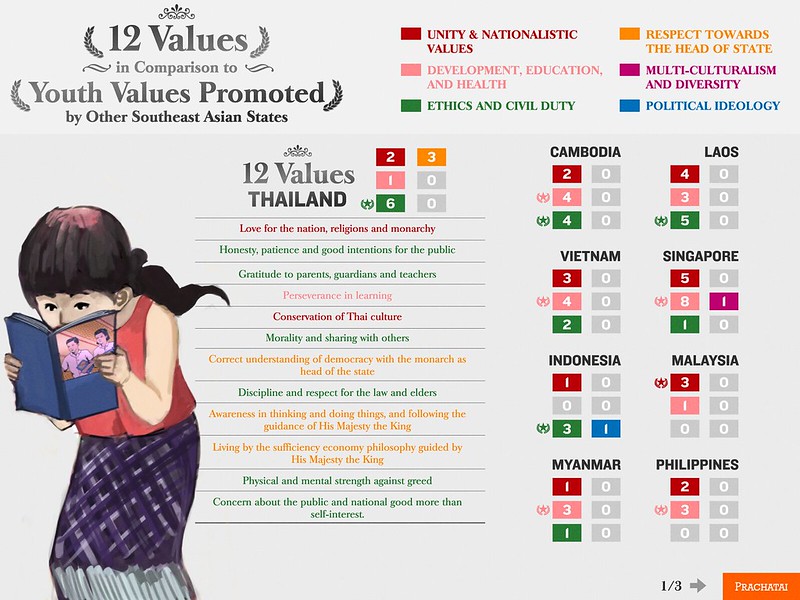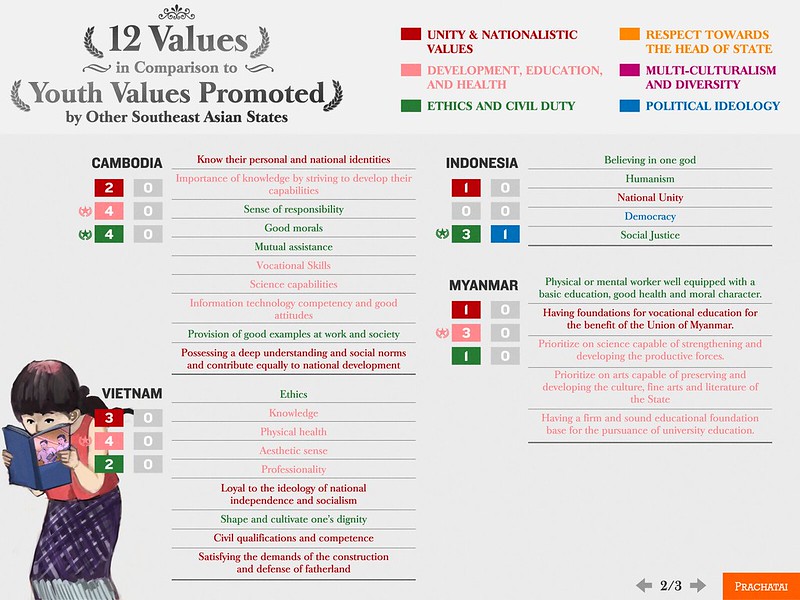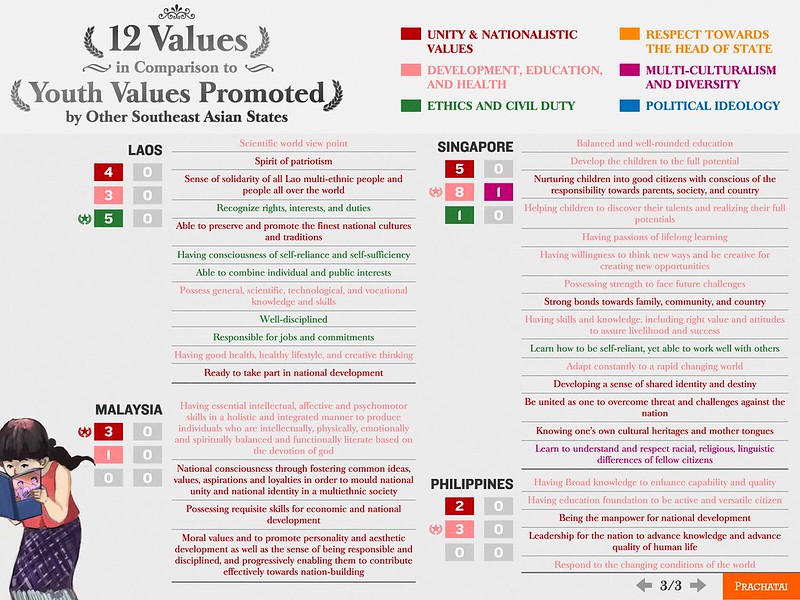
See large image here / scroll down to see two more infographics
Two months after the coup d’état in May, Thailand’s 2014 coup-maker set out a plan to reform Thailand’s education system, which is believed to be one of the worst in the region. But instead of improving the quality of educators and other structural problems apparent in the national curriculum, the junta has promoted 12 nationalistic Thai values to the top of the new education reform agenda. This kind of promotion of youth values through schools is not new to Thailand. Under the regime of Field Marshal Plaek Phibunsongkhram from 1938-1944, ten values for youth were promoted alongside other secular nationalistic values. Throughout Southeast Asia, different versions of national values for youth have been promoted through the education systems of many nations to serve certain development, reform, and political agendas.
With the exception of Brunei, Prachatai has compared the values promoted by the Thai junta to those of the other ASEAN members whose governments have written distinct desirable characters of the youth. The most commonly found values concern unity, development, and political ideologies. The values, to a certain degree, reflect the social, political and economic situation of each country. Moreover, throughout modern history the values are public propaganda directed towards the youth in order to shape and maintain certain ideologies.
Vivid examples of this are the Komsomol, a Soviet Union youth organization and the Hitler Youth, which were established in the 1920s and 1930s. Although, these youth organizations belonged to opposite ends of the political spectrum, the methods by which adolescents were drawn by these organizations to support the extreme left and right political ideologies were similar. To varying degrees, the Southeast Asian countries impose similar models of nationalism on their youth with different youth values.
The 12 national values which have just been invented by the junta aim to foster a sense of nationalism centring around the century-old three pillars of the Thai nation invented by King Vajiravudh (Rama VI) – nation, religion, and monarchy. Thailand is the only country where the head of state, the monarchy, is promoted in its national youth values, being highlighted in three of them. Also, the invented 12 traditional Thai values promoted by the Thai junta do not contain many definitive development or academic goals. However, many intangible values, which might have certain political and social implications are promoted by the junta.
- Love for the nation, religions and monarchy
- Honesty, patience and good intentions for the public
- Gratitude to parents, guardians and teachers
- Perseverance in learning
- Conservation of Thai culture
- Morality and sharing with others
- Correct understanding of democracy with the monarch as head of the state
- Discipline and respect for the law and elders
- Awareness in thinking and doing things, and following the guidance of His Majesty the King
- Living by the sufficiency economy philosophy guided by His Majesty the King
- Physical and mental strength against greed
- Concern about the public and national good more than self-interest.
Although it is the only other country in mainland Southeast Asia with a constitutional monarchy, Cambodia youth values, unlike the Thai versions, make no mention of the monarchy, but prioritize technological and scientific development with good morals and social responsibility, highlighted against the backdrop of the country’s bitter history.
- Knowing their personal and national identities
- Importance of knowledge by striving to develop their capabilities
- Sense of responsibility
- Good morals
- Mutual assistance
- Vocational skills
- Science capabilities
- Information technology competency and good attitudes
- Provision of good examples at work and society
- Possessing a deep understanding of social norms and contributing equally to national development
As one of the few socialist states in the region, Vietnam’s youth values heighten the country’s shared identity through national liberation from the colonial past and Ho Chi Minh’s socialist ideology to train the next generation to become civil servants.
- Ethics
- Knowledge
- Physical health
- Aesthetic sense
- Professionalism
- Loyalty to the ideology of national independence and socialism
- Shaping and cultivation of one’s dignity
- Civil qualifications and competence
- Satisfying the demands of the construction and defence of the fatherland
In parallel with the national slogan of Pancasila, coined during the Guided Democracy period under Sukarno, Indonesia’s youth values aim to unite the most diverse archipelagic country in the region with the rhetoric of democracy, national unity, and humanism.
- Believing in one god
- Humanism
- National unity
- Democracy
- Social justice
With limited literacy and access to education, the semi-military state government of the Union of Myanmar focuses on literacy and development in science and technology as a general theme.
- Being a manual or mental worker well equipped with a basic education, good health and moral character.
- Having the foundations of vocational education for the benefit of the Union of Myanmar.
- Priority to science capable of strengthening and developing the productive forces.
- Priority to arts capable of preserving and developing the culture, fine arts and literature of the state
- Having a firm and sound educational foundation for the pursuance of university education.
As one of the least developed countries in the region, the Lao government imposes their own version of 12 values, largely dealing with national unity, self-reliance, and social commitment to unite a multi-ethnic nation with science and technology reinforced for national development.
- Scientific world view point
- Spirit of patriotism
- Sense of solidarity of all Lao multi-ethnic people and people all over the world
- Recognition of rights, interests, and duties
- Ability to preserve and promote the finest national cultures and traditions
- Consciousness of self-reliance and self-sufficiency
- Ability to combine individual and public interests
- Possession of general, scientific, technological, and vocational knowledge and skills
- Good discipline
- Responsible for jobs and commitments
- Good health, healthy lifestyle, and creative thinking
- Readiness to take part in national development
With a total of 15 descriptive youth values, the Singaporean government includes every dimension of academic foundation in its education agenda to stay economically competitive. However, family and community values and multi-culturalism are also highlighted to foster the national bonds of Singapore’s diverse population.
- Balanced and well-rounded education
- Developing children to their full potential
- Nurturing children to be good citizens conscious of their responsibility towards parents, society, and country
- Help for children to discover their talents and realize their full potential
- Passion for lifelong learning
- Willingness to think in new ways and be creative for inventing new opportunities
- Possessing strength to face future challenges
- Strong bonds towards family, community, and country
- Skills and knowledge, including right values and attitudes to assure livelihood and success
- Learning how to be self-reliant, yet able to work well with others
- Adapting constantly to a rapidly changing world
- Developing a sense of shared identity and destiny
- Being united as one to overcome threats and challenges against the nation
- Knowing one’s own cultural heritage and mother tongue
- Learning to understand and respect the racial, religious, and linguistic differences of fellow citizens
Based on devotion to God (although the term is left inclusive), the Malaysian youth values prioritize economic and intellectual development with nationalistic undertones to unite the nation’s many ethnicities.
- Having essential intellectual, affective and psychomotor skills in a holistic and integrated manner to produce individuals who are intellectually, physically, emotionally and spiritually balanced and functionally literate based on a devotion to God
- National consciousness through fostering common ideas, values, aspirations and loyalties in order to mould national unity and a national identity in a multi-ethnic society
- Possessing requisite skills for economic and national development
- Moral values to promote personality and aesthetic development as well as the sense of being responsible and disciplined and progressively enabled to contribute effectively towards nation-building
Geared towards a knowledge-based society and national development, the Philippines’ youth values do not say a single word about religious values and morality although most of the country is known for its conservative Catholicism.
- Broad knowledge to enhance capability and quality
- Education foundation to be active and versatile citizens
- Being the manpower for national development
- Leadership for the nation to advance knowledge and advance the quality of human life
- Responding to the changing conditions of the world


Prachatai English is an independent, non-profit news outlet committed to covering underreported issues in Thailand, especially about democratization and human rights, despite pressure from the authorities. Your support will ensure that we stay a professional media source and be able to meet the challenges and deliver in-depth reporting.
• Simple steps to support Prachatai English
1. Bank transfer to account “โครงการหนังสือพิมพ์อินเทอร์เน็ต ประชาไท” or “Prachatai Online Newspaper” 091-0-21689-4, Krungthai Bank
2. Or, Transfer money via Paypal, to e-mail address: [email protected], please leave a comment on the transaction as “For Prachatai English”
